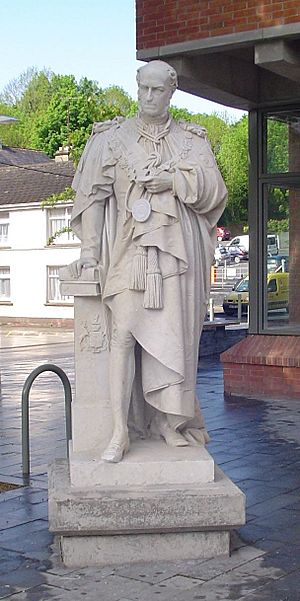Henry Maxwell, 7th Baron Farnham facts for kids
Henry Maxwell, 7th Baron Farnham (born August 9, 1799 – died August 20, 1868) was an important figure in Irish history. He was an Irish noble, a member of the British Parliament, and a large landowner in County Cavan. He was also a strong supporter of Protestant beliefs and the Orange Order. During times of great hunger in the late 1820s and late 1840s, he was known for asking tenants to change their religion to Protestantism if they wanted help. Sometimes, tenants were also asked to leave their homes.
A Life in Politics
Henry Maxwell was the son of the 6th Baron Farnham. In 1824, he was chosen to represent County Cavan in the House of Commons, which is part of the British Parliament. He was a member of the Conservative Party and held this position until 1838.
In 1838, he became the 7th Baron Farnham after his father passed away. This meant he inherited the very large Farnham Estate in County Cavan. From 1839 to 1868, he also served as an Irish Representative Peer. This meant he represented Irish nobles in the British Parliament. In 1845, he received a special honor and was made a Knight of St. Patrick.
While in Parliament, Henry Maxwell voted against several important changes. He voted against laws that would help Catholics gain more rights. He also voted against changes to how Parliament worked. He did not support taxing wealthy landowners who lived outside Ireland to help the poor Irish people.
Landlord and Religious Views
In 1827, a lawyer named George Ensor looked into claims that many tenants on the Farnham estate were changing their religion to Protestantism. This was happening during a time when people were struggling with hunger. Ensor reported that these conversions were often linked to people needing food or help. This practice was sometimes called "souperism," suggesting that people converted for food (soup) rather than true belief.
Henry Maxwell was also very active in Protestant groups. He helped start the Brunswick Club in Cavan, which supported loyalist causes. He also became a secretary for the Orange Order in Dublin.
During the terrible Great Famine that began in 1845, Lord Farnham's estate was again accused of "souperism." It was said that he would only offer food from his soup kitchens to those who agreed to give up their Catholic faith and join the Church of Ireland, which was the official Protestant church at the time. He also continued to ask tenants to leave their homes during this difficult period.
Tragic Death and Memorial
In August 1868, Henry Maxwell and his wife were tragically killed in a railway accident near Abergele, Wales. About 30 other people also died in the disaster. Their train, the London to Holyhead express, crashed into a goods train carrying petroleum. Their remains were so badly burned that they could only be identified by their pocket watches.
His brother, Somerset Richard Maxwell, took over his title and estates. A statue was later put up in Cavan to honor Henry Maxwell. The money for this statue was collected from his tenants by his younger brother. Today, the statue stands outside the Cavan County Council offices.
 | Shirley Ann Jackson |
 | Garett Morgan |
 | J. Ernest Wilkins Jr. |
 | Elijah McCoy |


